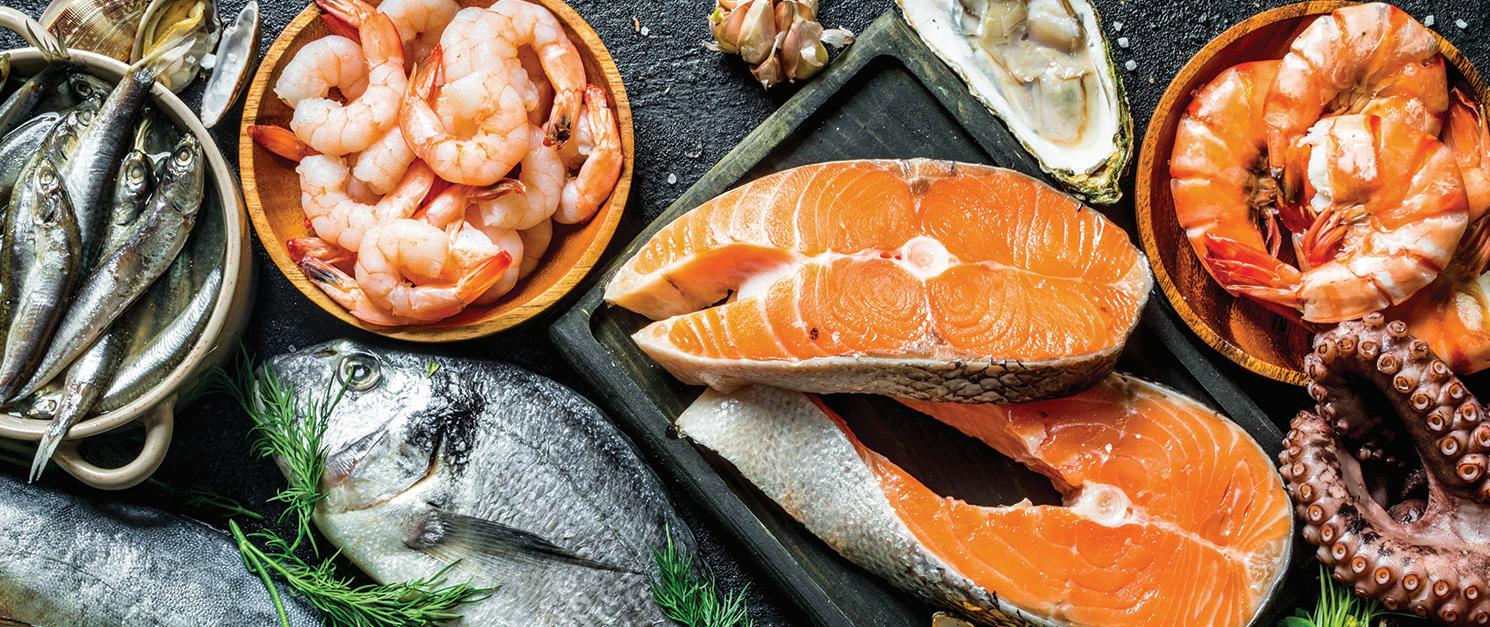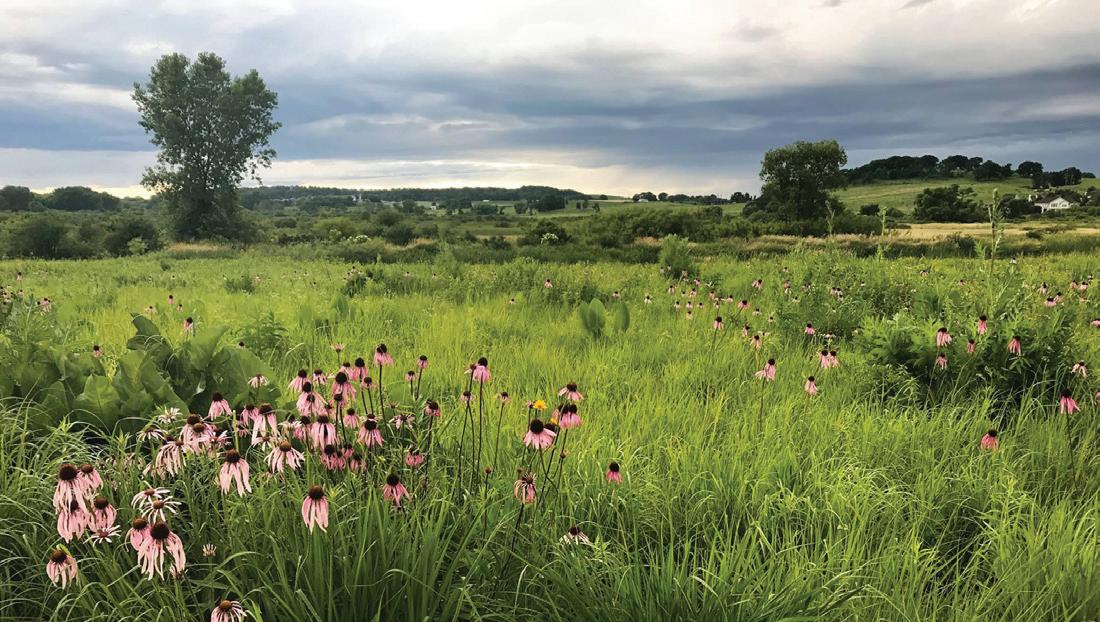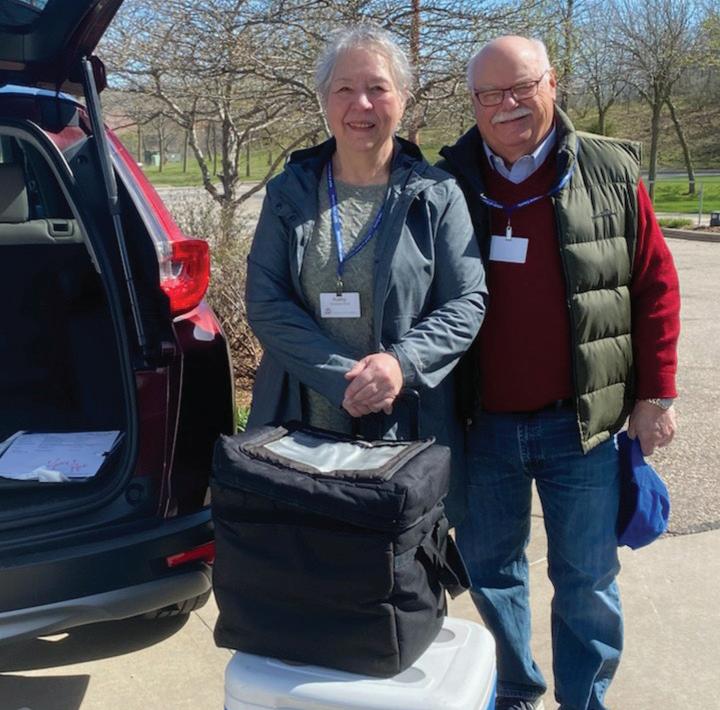
17 minute read
Senior Living
Elders who live alone need extra attention
Senior Living
Advertisement
BY STEPHEN RUDOLPH

When my mother-in-law was still with us, she lived next door, but she lived alone. We had built a duplex home so my in-laws could live next to us and age in place while we were nearby to assist. We made efforts not to intrude on their lives, and we would even call them before we went over to see them. After her husband passed, we were concerned about keeping tabs on her physical safety and emotional health. My wife is a registered nurse, so she could help her mom with her diabetes, her nutrition and other ailments. She also made certain her mom saw her physician on a regular basis. However, not all elders live close to their children, and sometimes they go without any help from their neighbors or friends. Thats an unsafe situation, both physically and mentally, so if you know someone who lives alone, please help that person by giving him or her your time. According to the Pew Research Center (pewresearch.org), U.S. adults ages 60 and older also are more likely than their counterparts around the world to live as a couple without young children at home. Almost half of Americans in this age group (46%) share a home with only one spouse or partner, compared 31% globally. Census figures suggest about 14 million seniors are aging alone. According to a post by senior care referral agency A Place For Mom, elder loneliness resulting from living alone can result in health complications, increase the rate of dementia, increasing unhealthy habits and higher instance of elder abuse. Senior isolation is both common and dangerous and while living alone doesnt inevitably lead to senior loneliness, the two often go hand-in-hand, it points out. If you are not close enough to your elderly loved one to check in regularly, perhaps a friend or neighbor can do this or you can hire someone. Meal delivery and cleaning services might also be a good idea. A home care company in the area that specializes in home care for the elderly could assist. If your loved on requires a bed with railings and/or appliances that assist them to remain in their home you can contact a durable medical equipment (DME) company. My mother-in-law lived to age 90 and wore a necklace that would allow her to call for help if she fell. When she fell the first time, we were able to be with her within five minutes. If there is tension between you and your loved one, now is the time for forgiveness. Mathew 6:15 says But if you do not forgive others their trespasses, neither will your Father forgive your trespasses. Providing this kind of care to your loved one can feel like a burden on your shoulders. But remember that as children, your loved one did not have a very easy time caring for us. (Thats especially true for someone like me!) One way to check in regularly is starting some rituals you and your elder can enjoy together. For example, you could enjoy a cup of coffee or breakfast with them once a week or take a car drive, pray together, read together or watch TV together. My wife and I enjoyed playing cards with her mother and her mothers husband and preparing a meal for them at least once a week. You could encourage them to do some exercise because it is good physically and emotionally. Plan to visit with them as often as you can, especially if you live nearby. Encourage your family members to visit as circumstances permit. And if your loved one has grandchildren or great-grandchildren, encourage them to visit, too. In their innocence, children secure great wonder and joy from elders because of their life experience and their wisdom that comes with age. The point is to carve out some time for them each week to do something together you both enjoy. Stephen Rudolph is a consultant for Comfort Keepers of South Central Wisconsin, a home care agency that provides skilled nursing and personal care services for aging adults, those with disabilities and others needing assistance.
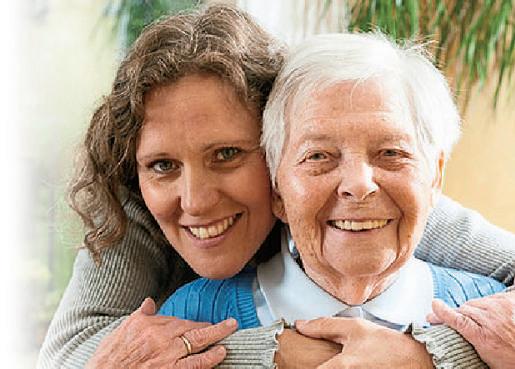
Areas of Law Practice
Estate Planning / Elder Law • Probate / Guardianship Special needs (Disability) • WisPACT Trust / Real Estate Medicaid/Medicare • Family Law • VA Accredited Social Security Attorneys
Brenda R. Haskins • Julie A. Short Anne M. H. Brindley • Anna M. Dontje Amy Devine • Amanda Pirt Meyer
5113 Monona Drive • Monona, WI 53716 Phone: 608-237-6673 www.HSBElderLaw.com Professional and compassionate legal services
adno=219271
50+ years combined experience!
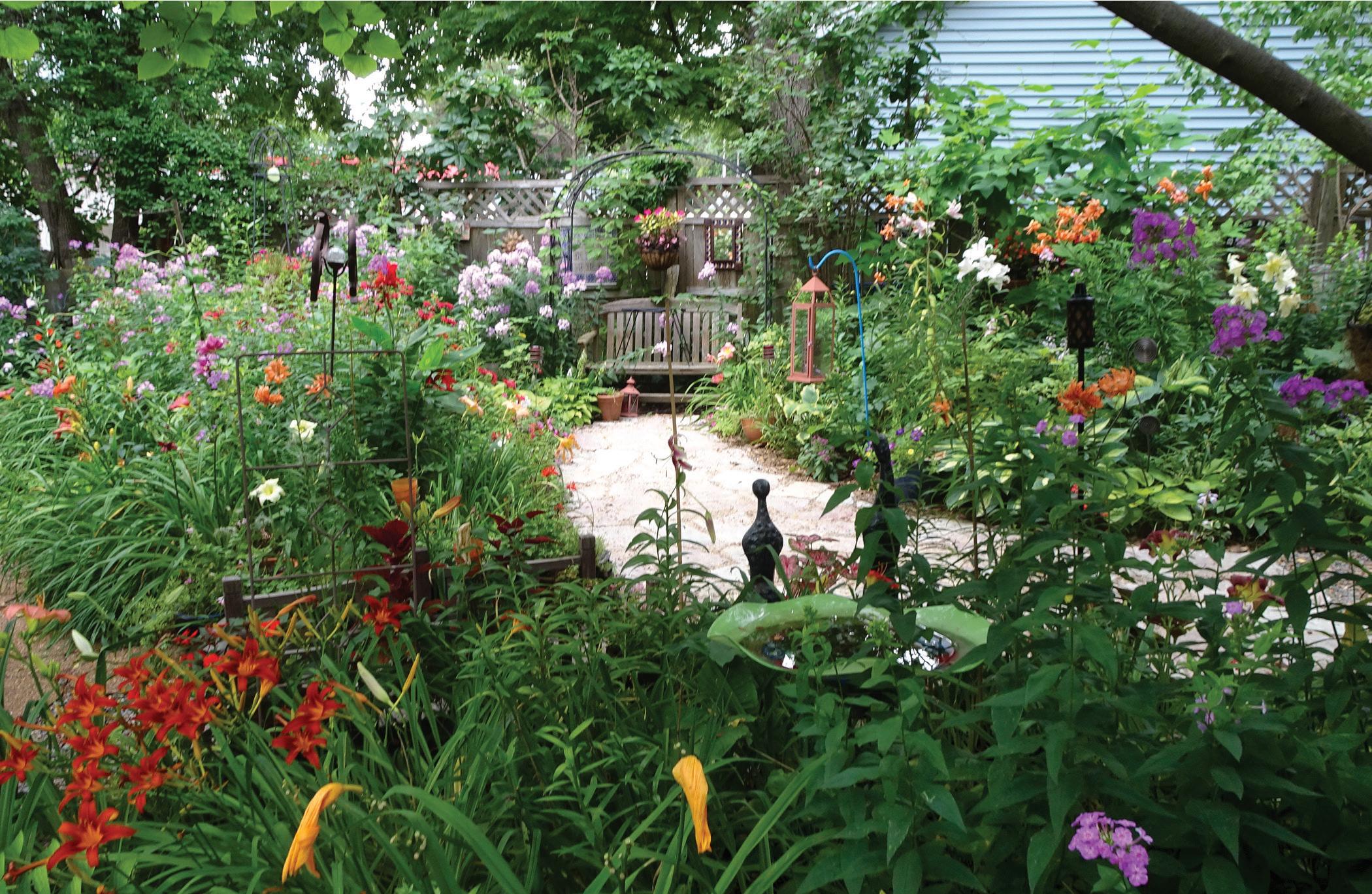
Jim Ottney and Jay Hatheway found that sitting in their garden surrounded by plants was a safe and enjoyable pastime during the COVID-19 pandemic. While they have one of the largest lots in Stoughton, they agree that gardening can be any size.
Tending the garden and your well-being
After months stuck inside, getting out and enjoying nature is beneficial in many ways
Story by Molly Carmichael - Photos by Emilie Heidemann and Molly Carmichael
Self-proclaimed “Earth Mother” Jane Qualle has been gardening nearly her whole life. Now retired, Qualle spends her days tending to her Madison-based, chemical free garden. Pulling tens of feet of creeping charlie out of the dirt, adding to her compost bin and keeping an eye for the deer who stop by from Cherokee Marsh are just a few of her usual tasks. And while it sounds like hard work, Qualle has found gardening to be a lifelong hobby that keeps her stress levels down and her body active. And she’s not alone, as others around the area have found gardening to be a particularly helpful tool to get through these difficult pandemic months. For Stoughton couple Jim Ottney and Jay Hatheway, these months of social distancing have provided a
great opportunity to be active outdoors, and some time to take their gardens to a whole new level. Retired public health worker Barb Hill turned her restlessness during the COVID pandemic into activity in her garden, and finding calm in getting back to nature. The benefits of gardening go beyond having fresh produce at hand or catching the eye of a passerby. While being cooped up in her home and isolated from friends because of COVID-19 guidelines, Qualle said that tending to her garden kept her feeling happy during a time when much else wasn’t. But it doesn’t take much experience or Earth Mother status to feel these same effects. Gardening, especially after this past year, can help seniors boost their spirits, stay active and take a step back from the screen to connect with one another. Jonquil Nelson, founder of Sage Gardeners in Bozeman, Montana, is currently featured on the AARP website for her work with seniors and gardening. She said growing plants has a powerful effect on seniors, and she encourages them to plant seeds indoors “because it starts this sense of hope.” “It’s something to do every day, to check on it, water it, look forward to something -- food on the plate,” she says. “It’s powerful.”
Soul-calming work
Qualle jokes she doesn’t let guests leave until they compliment her garden. Her yard during the spring and summer months is full of vibrant perennials such as butter-yellow daffodils, flourishing hostas and marigolds -- but these serve a purpose greater than wooing visitors.
Continued on page 12
No garden? No problem
Not everyone has a spare acre or so, but there’s no need to have a full-blown garden to reap the overall emotional and physical benefits of getting outside and gardening, said UW-Extension horticulture outreach specialist Julie Hill. “I don’t think everybody has to have a vegetable garden in their backyard,” Hill said. “But just having those kinds of interactions with plants and nature in any way that we can is really beneficial.” Just keeping a few low-maintenance plants in your home can be helpful. Madison-based gardener Jane Qualle said she always keeps a few sturdy plants inside year-round to brighten up her house. One of those is a Christmas cactus which she’s had for nearly 50 years, as well as some hardy jade plants that can survive a few missed waterings. She explained that keeping these easygoing plants around is a great way to bring those soothing aspects of her garden indoors, but also not have to worry if she leaves for a vacation.
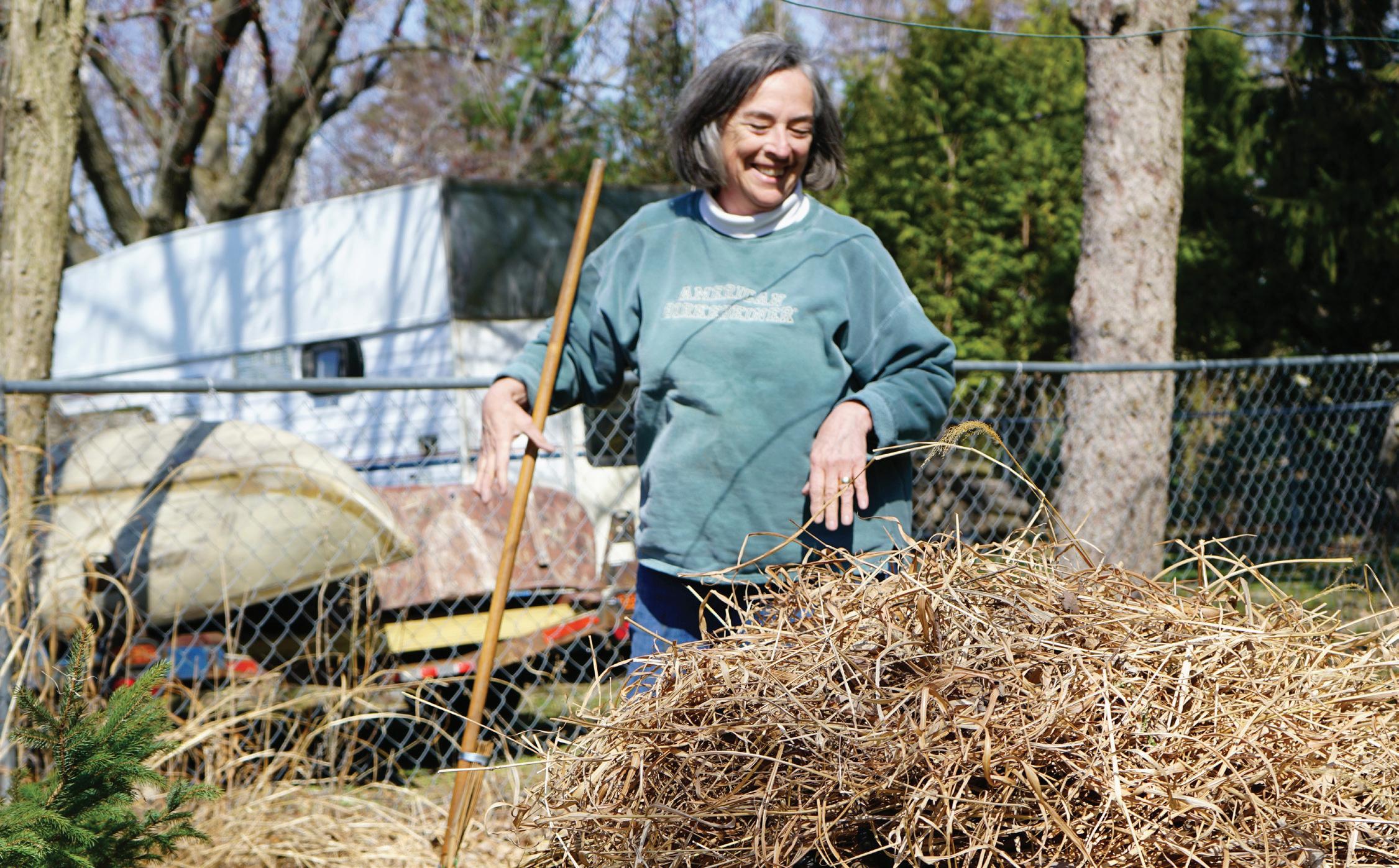
12 Young at Heart April 2021 Unified Newspaper Group GARDEN TENDING from page 11
Growing up, helping in her mother’s garden and begrudgingly pulling weeds was one of her least favorite chores. Today, she says digging into the ground and scouring her yard in search of random thistles or dandelions is quite therapeutic. For Qualle, this connectedness takes a spiritual form -- digging into the dirt isn’t just a way to get the ground ready for her perennials. A self-proclaimed “Earth Mother,” she said it helps remind her to take care of the Earth and enjoy all it has to offer. Qualle said even a quick peek out of the window to see her blossoming flowers, butterflies dancing around and the more than occasional deer will soothe her anxieties. She said it’s the best way to destress and decompress after a long day -- or from just being stuck inside. “It’s sort of meditative,” she said. “It’s a chance to just set off the rest of the world and just enjoy nature and what have you. “The Earth is just like everything to me, so when I’m out and I’m able to dig in the dirt and everything, it just calms my soul,” she added.
Over the past year, as the COVID-19 pandemic has turned normal life upside down, Qualle could find much-needed solace in her garden. It was a way to ease her mind and stay busy and not fixate on things she can’t control, she said. “What better stress release than to be in touch with Mother Earth, to dig into the soil and appreciate what Mother Earth has to offer us?” Qualle said. “It has a way of turning off my mind and just letting my mind wander into things that are positive and happy. “I am on the verge of 70 years old, and I can’t believe it because I feel like I’m 35.”
Even before 2020, Ottney and Hatheway found gardening to be a great way to shake off the work day. Ottney, a retired graphic designer, and Hatheway, an Edgewood College professor, use it as a way to break away from the screen and put a pause on stress. “When I’m out gardening and just away from the rest of the world it is really, for me, always a very relaxing activity,” Ottney said. “Even when it was hard work, it was still kind of a distraction from everything else going on in life and not worrying about my work life.” The calming, zen-like effects of
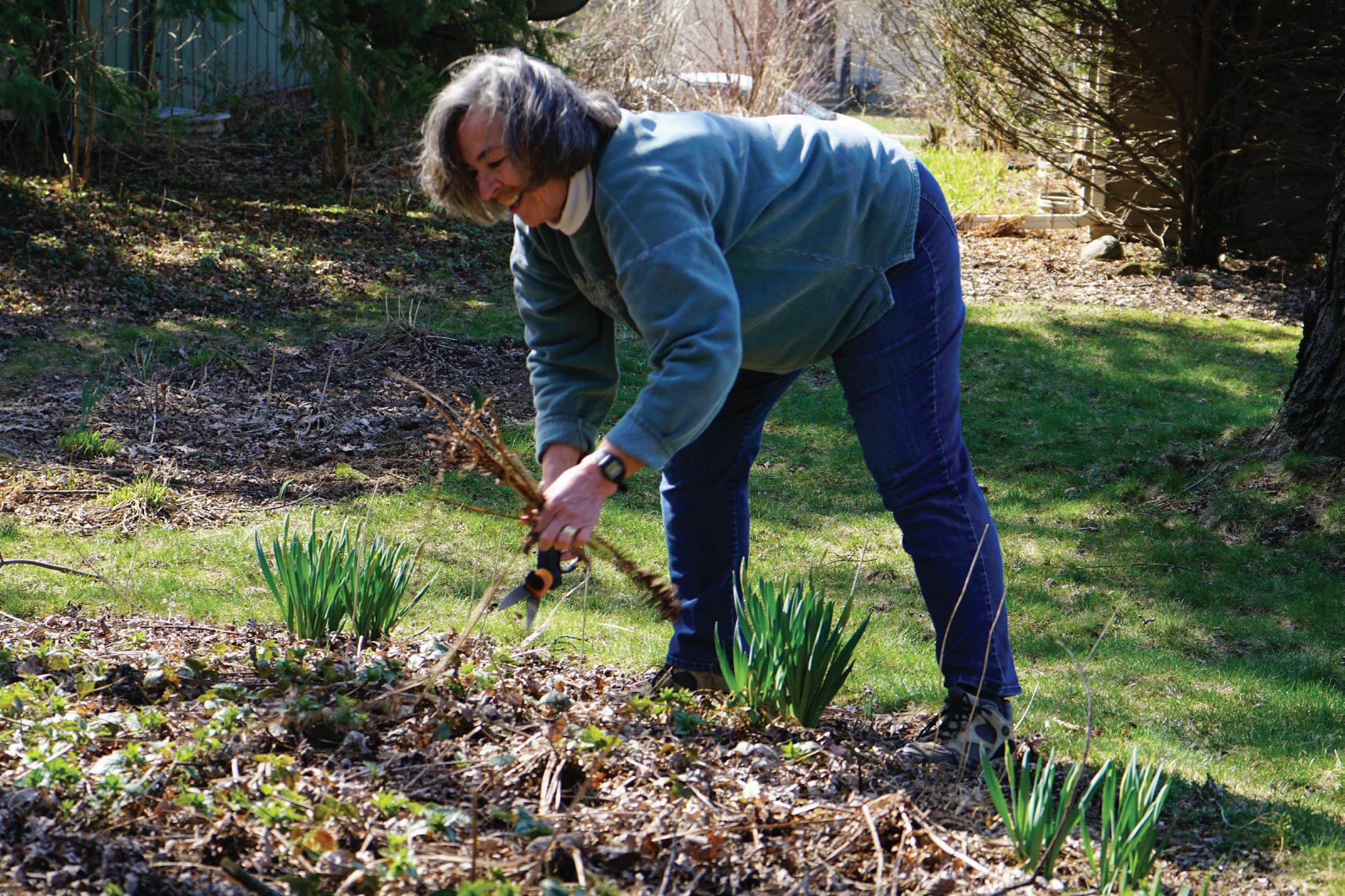
gardening have been “amplified” during the pandemic, he said. There weren’t many activities besides sitting around the house all day and worrying. And for folks who are looking to get started, Ottney thinks there are two things to keep in mind: size and budget. “Gardening can be any size, but you need to know what your budget is,” Ottney said. “You have to understand that gardening can be expensive, doesn’t have to be, but it can be and you need to know how much you want to spend,” Ottney said. Start with a few things and work from there. It can be laborious, he said, more so for those who aren’t retired or working from home and will need to squeeze a lot of projects into the weekend.
Then again, for those who are looking for some extra cardio work, gardening can provide that. Hatheway said he’s never liked the gym and found gardening to be a better form of exercise -- especially now that it’s closed, he quipped. “It was very, very, very useful during quarantine,” he said. “It gave us an opportunity to get out of the house and do something physical and make stuff nice.” It’s never repetitive exercise, he said. Sometimes there’s bending down to weed, other times there’s crouching to dig into the dirt -- but it’s never the same thing like running on the treadmill for a half-hour or doing bench presses and stressing his body out. Sitting in their pergola, surrounded by vibrant tulips, hostas and other perennials, Ottney and Hatheway said that the best summer evenings were spent in their pergola, with a glass of wine, a plate of cheese and a view of their hard work.
- Madison-based gardener Jane Qualle
And since most entertaining and relaxing pastimes have been out of the question over the past year, the garden served as the primary way for the two to escape the home office drudgery and connect with one another.
Keeping busy during COVID
Hill said when the pandemic hit last March, she knew she’d be stuck at home for the next few weeks. When it began to warm up, and that began to turn into months, she said her routines grew fuzzy, her husband a bit restless. Luckily for Hill -- an avid volunteer and treasurer at Anderson Park Friends, a community garden in Oregon -- her sprawling flower and vegetable garden behind her home helped her maintain a sense of “normalcy.” She had a set of tasks ahead of her each day. Sometimes that entailed chasing out Japanese beetles with soapy water, scanning the garden for weeds, checking the perimeter for evidence of pesky gophers or just tending to her tomatoes and onions. Gardening has always been a way for Hill to keep herself busy and active, she said. But as a senior, it was crucial over this past year, as lockdown forced many senior centers completely halted in-person events and clubs. Like many of her peers, she said she found calmness right in her own backyard, and is looking forward to getting back to gardening as spring approaches. Hill said being able to immerse and lose herself in gardening work was the best way to relieve any type of anxiety.
Boosting mind, body and spirit
The benefits of gardening go beyond having fresh produce at hand, catching the eye of a passerby or upholding routine during a pandemic. Gardening and getting outside doing nature-based activities can help seniors boost their minds, bodies and spirits, said UW-Extension horticulture outreach specialist Julie Hill. Extensive research has shown a positive relationship between getting out in nature and reducing stress, she said, and studies have found those who take time to tend to plants or take a quick walk through a forest preserve can have less negative feelings. Getting fresh air, surrounding oneself with plants and being out in the sun can reduce feelings of depression and anxiety, Hill said, particularly during the pandemic. Gardening and nature-based experiences can also be a great way for seniors to stay physically active and healthy. Hill said for seniors with physical disabilities or injuries, gardening might be an ideal exercise option with modern technology. For example, container gardening -- using pots and other receptacles as planters -- allows seniors to keep things at standing level or put them in a wheelchair and walker-accessible locations. Opting for raised beds rather than ground planting is easier on the back and knees, Hill said. There are alternatives, we can still do gardening, even if we dont have a lot of mobility, she said. On top of the obvious benefits of exercising through gardening tasks like lifting pots or pulling weeds, getting outdoors can boost the immune system, lower blood pressure and heart rate. Hill said that being outdoors and taking part in nature-based activities can also foster a sense of connectedness. Even for those who do not consider themselves spiritual, it can create a bond to the Earth and just a general sense of belonging, she said. This connectedness to the surrounding environment is important, given how difficult it can be to make social and emotional connections these days. Its that feeling of connectedness that I think nature brings out in us, she said. Its not necessary to be religious, but still, some people are very connected to their faith and these experiences help with that.
How to get involved
Community gardens Seniors looking to combine their love of gardening with community service might be interested in volunteering at a local community garden. Community gardens contribute to the overall well-being of a neighborhood by increasing access to healthy produce and helping to foster social bonds between residents, according to a report by Public Health Madison and Dane County. Places like the Anderson Park Friends in Oregon or the Sugar River Edible Gardens in Verona are always welcoming new volunteers to help maintain and run the gardens. Garden club
Joining a club is a way to meet other gardening enthusiasts, share tips and tricks and take part in service projects. The Wisconsin Garden Federation has several locations, including four different locations in the greater Madison area. Most clubs meet monthly for members to plan civic beautification projects, learn about horticulture, address sustainability concerns, make garden crafts, arrange flowers and take garden tours around the state. GARDEN TENDING from page 13
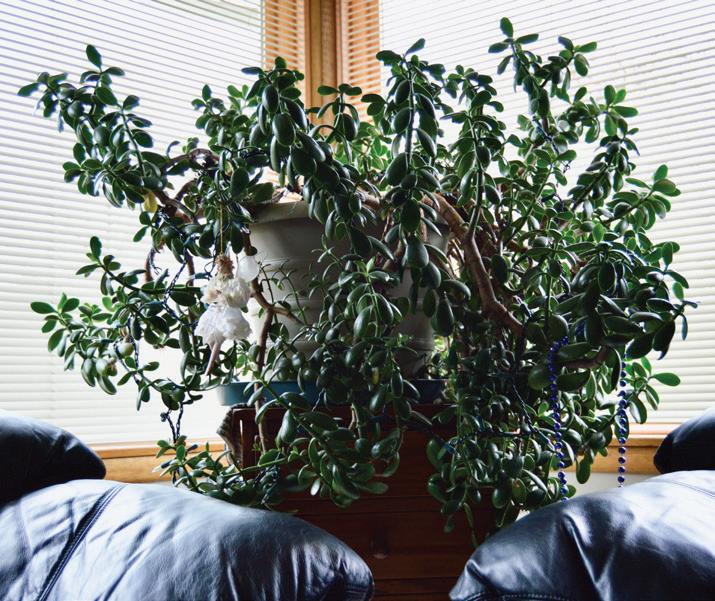
Jane Qualle keeps a few hardy plants around, like this Christmas cactus, as a low-maintenance way to brighten up her home. She said the smell of the damp ground, feeling the dirt in her hands, hearing the birds chirp and feeling the sunshine on her back while digging put her at ease. “For me, it’s just one of the things I love to do, and if you love something, it’s not work,” Hill said. Hill is an avid volunteer at Anderson Park Friends community garden in Oregon. There she helps maintain the park, choose what produce to plant and donate some of it to food pantries around the community. Through this community gardening, she is able to feel connected in a more literal sense. This past summer, she was able to work amongst other volunteers in a safe, distanced outdoor environment--all while facilitating donations throughout Oregon and Brooklyn. While it seems the end of the COVID-19 pandemic is in sight, Hill said that gardening is a way to take back some of that control. With gardening, the possibilities and personal benefits are endless, she said. “Because of the pandemic a lot of people felt that they lost control over their lives,” Hill said. “They’re suddenly being told to do this, do that, or you can’t do this, you can’t do that, but with gardening, there aren’t really any ‘cant’s.’ You could try anything.”
TOUR ALL THREE
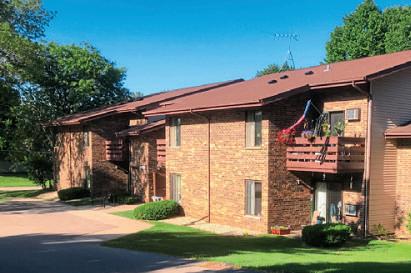
Wisconsin Horticulture
Based out of the University of Wisconsin-Madison Extension, Wisconsin Horticulture connects and educates gardeners and nature lovers throughout the state. Master gardeners lead conversations on topics like tree diseases, testing for soil health and dealing with pests Many programs are virtual and available through local community centers, libraries and the Wisconsin Horticulture website, hort.extension.wisc.edu. RETIREMENT HOUSING

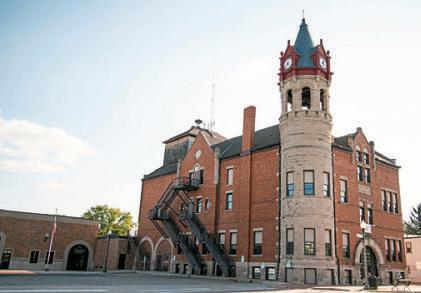

Independent Living Apartments & Communities
Edgerton Retirement Apartments
505 Stoughton Rd., Edgerton | (608) 884-9009 era@bmcmadison.com Lovely apartment community nestled in a quiet park-like setting with 24 one-bedroom apartments including a community kitchen and dining area.
Genesis Apartments
230 S. Oak St., Oregon | (608) 835-8600 customerservice@genesishousinginc.org | genesishousinginc.org Affordable apartment community with 56 one- and two- bedrooms located in the heart of downtown Oregon and Brooklyn. Our rent includes all utilities!
Greenspire Apartments
924 Jackson St., Stoughton | (608) 873-7855 greenspire@sbcglobal.net Located a few blocks from downtown Stoughton, over 90 one- and two-bedroom apartments that are convenient to shopping, hospital and doctors.
All properties including 24-hour emergency maintenance, attentive onsite management, onsite laundry and parking. Affordable communities for those 62+ and/or disabled. Income limits apply, rental assistance may be available.

Managed With Care®
bmcmadison.com
Equal Opportunity Provider

